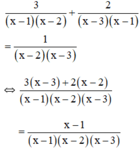
Hãy nhập câu hỏi của bạn vào đây, nếu là tài khoản VIP, bạn sẽ được ưu tiên trả lời.


Điều kiện xác định: x ≠ 1; x ≠ 2; x ≠ 3.

⇒ 3(x – 3) + 2(x – 2) = x – 1
⇔ 3x – 9 + 2x – 4 = x – 1
⇔ 3x + 2x – x = 9 + 4 – 1
⇔ 4x = 12
⇔ x = 3 (không thỏa mãn điều kiện xác định)
Vậy phương trình vô nghiệm.

\(\left(x-1\right)^3-\left(x-1\right)\left(2x-3\right)\left(3x-5\right)+\left(2x-3\right)^3-\left(x-1\right)\left(2x-3\right)\left(3x-5\right)+\left(3x-5\right)^3-\left(x-1\right)\left(2x-3\right)\left(3x-5\right)=0\)
\(\Leftrightarrow\left(x-1\right)\left(\left(x-1\right)^2-\left(2x-3\right)\left(3x-5\right)\right)+\left(2x-3\right)\left(\left(2x-3\right)^2-\left(x-1\right)\left(3x-5\right)\right)+\left(3x-5\right)\left(\left(3x-5\right)^2-\left(x-1\right)\left(2x-3\right)\right)=0\)
\(\Leftrightarrow\left(x-1\right)\left(x-2\right)\left(7-5x\right)+\left(2x-3\right)\left(x-2\right)^2+\left(3x-5\right)\left(x-2\right)\left(7x-11\right)=0\)
\(\Leftrightarrow\left(x-2\right)\left(\left(x-1\right)\left(7-5x\right)+\left(2x-3\right)\left(x-2\right)+\left(3x-5\right)\left(7x-11\right)\right)=0\)
\(\Leftrightarrow\left(x-2\right)\left(18x^2-63x+54\right)=0\)
\(\Leftrightarrow\left[{}\begin{matrix}x-2=0\\18x^2-63x+54=0\end{matrix}\right.\)
\(\Leftrightarrow\left[{}\begin{matrix}x=2\\x=\dfrac{3}{2}\end{matrix}\right.\)

\(a,\dfrac{x-3}{x}=\dfrac{x-3}{x+3}\)\(\left(đk:x\ne0,-3\right)\)
\(\Leftrightarrow\dfrac{x-3}{x}-\dfrac{x-3}{x+3}=0\)
\(\Leftrightarrow\dfrac{\left(x-3\right)\left(x+3\right)-x\left(x-3\right)}{x\left(x+3\right)}=0\)
\(\Leftrightarrow x^2-9-x^2+3x=0\)
\(\Leftrightarrow3x-9=0\)
\(\Leftrightarrow3x=9\)
\(\Leftrightarrow x=3\left(n\right)\)
Vậy \(S=\left\{3\right\}\)
\(b,\dfrac{4x-3}{4}>\dfrac{3x-5}{3}-\dfrac{2x-7}{12}\)
\(\Leftrightarrow\dfrac{4x-3}{4}-\dfrac{3x-5}{3}+\dfrac{2x-7}{12}>0\)
\(\Leftrightarrow\dfrac{3\left(4x-3\right)-4\left(3x-5\right)+2x-7}{12}>0\)
\(\Leftrightarrow12x-9-12x+20+2x-7>0\)
\(\Leftrightarrow2x+4>0\)
\(\Leftrightarrow2x>-4\)
\(\Leftrightarrow x>-2\)

a) |3x| = x + 6 (1)
Ta có 3x = 3x khi x ≥ 0 và 3x = -3x khi x < 0
Vậy để giải phương trình (1) ta quy về giải hai phương trình sau:
+ ) Phương trình 3x = x + 6 với điều kiện x ≥ 0
Ta có: 3x = x + 6 ⇔ 2x = 6 ⇔ x = 3 (TMĐK)
Do đó x = 3 là nghiệm của phương trình (1).
+ ) Phương trình -3x = x + 6 với điều kiện x < 0
Ta có -3x = x + 6 ⇔ -4x + 6 ⇔ x = -3/2 (TMĐK)
Do đó x = -3/2 là nghiệm của phương trình (1).
Vậy tập nghiệm của phương trình đã cho S = {3; -3/2}

ĐKXĐ: x ≠ 0, x ≠ 2
Quy đồng mẫu hai vễ của phương trình, ta được:

![]()
![]()
![]()

![]()
Vậy tập nghiệm của phương trình là S = {-1}
c) (x + 1)(2x – 2) – 3 > –5x – (2x + 1)(3 – x)
⇔ 2x2 – 2x + 2x – 2 – 3 > –5x – (6x – 2x2 + 3 – x)
⇔ 2x2 – 5 ≥ –5x – 6x + 2x2 – 3 + x
⇔ 10x ≥ 2 ⇔ x ≥ 1/5
Tập nghiệm: S = {x | x ≥ 1/5}

\(a,6x^2-5x+3=2x-3x\left(3-2x\right)\)
\(\Leftrightarrow6x^2-5x+3=2x-9x+6x^2\)
\(\Leftrightarrow6x^2-6x^2-5x-2x+9x=-3\)
\(\Leftrightarrow2x=-3\)
\(\Leftrightarrow x=-\dfrac{3}{2}\)
\(b,\left(3x-1\right)\left(4x+3\right)=2\left(3x-1\right)\)
\(\Leftrightarrow\left(3x-1\right)\left(4x+3\right)-2\left(3x-1\right)=0\)
\(\Leftrightarrow\left(3x-1\right)\left(4x+3-2\right)=0\)
\(\Leftrightarrow\left[{}\begin{matrix}3x-1=0\\4x+1=0\end{matrix}\right.\)
\(\Leftrightarrow\left[{}\begin{matrix}x=\dfrac{1}{3}\\x=-\dfrac{1}{4}\end{matrix}\right.\)
\(6x^2-5x+3=2x-3x\left(3-2x\right)\)
\(\Leftrightarrow6x^2-5x+3=2x-9x+6x^2\)
\(\Leftrightarrow6x^2-5x+3-2x+9x-6x^2=0\)
\(\Leftrightarrow2x+3=0\)
\(\Leftrightarrow2x=-3\)
\(\Leftrightarrow x=\dfrac{-3}{2}\)
\(\text{Vậy phương trình có tập nghiệm là }S=\left\{\dfrac{-3}{2}\right\}\)
\(\left(3x-1\right)\left(4x+3\right)=2\left(3x-1\right)\)
\(\Leftrightarrow\left(3x-1\right)\left(4x+3\right)-2\left(3x-1\right)=0\)
\(\Leftrightarrow\left(3x-1\right)\left(4x+3-2\right)=0\)
\(\Leftrightarrow\left(3x-1\right)\left(4x-1\right)=0\)
\(\Leftrightarrow\left[{}\begin{matrix}3x-1=0\\4x-1=0\end{matrix}\right.\Leftrightarrow\left[{}\begin{matrix}3x=1\\4x=1\end{matrix}\right.\Leftrightarrow\left[{}\begin{matrix}x=\dfrac{1}{3}\\x=\dfrac{1}{4}\end{matrix}\right.\)
\(\text{Vậy phương trình có tập nghiệm là }S=\left\{\dfrac{1}{3};\dfrac{1}{4}\right\}\)

a: =>x(x+3)=0
=>x=0 hoặc x=-3
b: =>x(1-2x)=0
=>x=0 hoặc x=1/2
c: =>(x-7)(2x+3-x)=0
=>(x-7)(x+3)=0
=>x=7 hoặc x=-3
d: =>(x-2)(3x-1-x-3)=0
=>(x-2)(2x-4)=0
=>x=2
a)
`x^2 +3x=0`
`<=>x(x+3)=0`
\(< =>\left[{}\begin{matrix}x=0\\x+3=0\end{matrix}\right.\\ < =>\left[{}\begin{matrix}x=0\\x=-3\end{matrix}\right.\)
b)
`x-2x^2 =0`
`<=>x(1-2x)=0`
\(< =>\left[{}\begin{matrix}x=0\\1-2x=0\end{matrix}\right.\\ < =>\left[{}\begin{matrix}x=0\\x=\dfrac{1}{2}\end{matrix}\right.\)
c)
`(x-7)(2x+3)=x(x-7)`
`<=>(x-7)(2x+3)-x(x-7)=0`
`<=>(x-7)(2x+3-x)=0`
`<=>(x-7)(x+3)=0`
\(< =>\left[{}\begin{matrix}x-7=0\\x+3=0\end{matrix}\right.\\ < =>\left[{}\begin{matrix}x=7\\x=-3\end{matrix}\right.\)
d)
`(x-2)(x+3)=(x-2)(3x-1)`
`<=>(x-2)(x+3)-(x-2)(3x-1)=0`
`<=>(x-2)(x+3-3x+1)=0`
`<=>(x-2)(-2x+4)=0`
\(< =>\left[{}\begin{matrix}x-2=0\\-2x+4=0\end{matrix}\right.\\ < =>x=2\)


1/ ( x-1) (2x+1) =0
\(\Rightarrow\left[{}\begin{matrix}x-1=0\\2x+1=0\end{matrix}\right.\\ \Rightarrow\left[{}\begin{matrix}x=1\\x=-0,5\end{matrix}\right.\)
2/ x (2x-1) (3x+15) =0
\(\Rightarrow\left[{}\begin{matrix}x=0\\2x-1=0\\3x+15=0\end{matrix}\right.\\ \Rightarrow\left[{}\begin{matrix}x=0\\x=0,5\\x=-5\end{matrix}\right.\)
3/ (2x-6) (3x+4).x=0
\(\Rightarrow\left[{}\begin{matrix}2x-6=0\\3x+4=0\\x=0\end{matrix}\right.\\ \Rightarrow\left[{}\begin{matrix}x=3\\x=-\dfrac{4}{3}\\x=0\end{matrix}\right.\)
4/ (2x-10)(x2+1)=0
\(\Rightarrow\left[{}\begin{matrix}2x-10=0\\x^2+1=0\end{matrix}\right.\\ \Rightarrow\left[{}\begin{matrix}x=5\\x^2=-1\left(loại\right)\end{matrix}\right.\)
5/ (x2+3) (2x-1) =0
\(\Rightarrow\left[{}\begin{matrix}x^2+3=0\\2x-1=0\end{matrix}\right.\\ \Rightarrow\left[{}\begin{matrix}x^2=-3\left(loại\right)\\x=0,5\end{matrix}\right.\)
6/ (3x-1) (2x2 +1)=0
\(\Rightarrow\left[{}\begin{matrix}3x-1=0\\2x^2+1=0\end{matrix}\right.\\ \Rightarrow\left[{}\begin{matrix}x=-\dfrac{1}{3}\\x^2=-0,5\left(loại\right)\end{matrix}\right.\)
1: Ta có: \(\left(x-1\right)\left(2x+1\right)=0\)
\(\Leftrightarrow\left[{}\begin{matrix}x-1=0\\2x+1=0\end{matrix}\right.\Leftrightarrow\left[{}\begin{matrix}x=1\\x=-\dfrac{1}{2}\end{matrix}\right.\)
2: Ta có: \(x\left(2x-1\right)\left(3x+15\right)=0\)
\(\Leftrightarrow\left[{}\begin{matrix}x=0\\2x-1=0\\3x+15=0\end{matrix}\right.\Leftrightarrow\left[{}\begin{matrix}x=0\\x=\dfrac{1}{2}\\x=-5\end{matrix}\right.\)
3: Ta có: \(\left(2x-6\right)\left(3x+4\right)x=0\)
\(\Leftrightarrow\left[{}\begin{matrix}2x-6=0\\3x+4=0\\x=0\end{matrix}\right.\Leftrightarrow\left[{}\begin{matrix}x=3\\x=-\dfrac{4}{3}\\x=0\end{matrix}\right.\)

\(\Leftrightarrow\left(3x-5\right)^3-3\left(x-1\right)\left(2x-3\right)\left(3x-5\right)+\left(2x-3\right)^3+\left(x-1\right)^3=9\left(x-2\right)^2\left(2x-3\right)\)
\(\Rightarrow x^2-4x+4=0\)
\(\Rightarrow\left(-4\right)^2-4\left(1.4\right)=0\)(cái này là D )
\(\Rightarrow x_{1,2}=\frac{-b+-\sqrt{D}}{2a}=\frac{4+-\sqrt{0}}{2}\)
\(\Rightarrow2x-3=0\)
\(\Rightarrow2x=3\)
\(\Rightarrow x=\frac{3}{2}\)hoặc\(x=2\)
Hướng dẫn:
Ta có 2x - ( 3 - 2x ) = 3x + 1 ⇔ 2x - 3 + 2x = 3x + 1
⇔ 4x - 3x = 1 + 3 ⇔ x = 4.
Vậy phương trình đã cho có tập nghiệm là S = { 4 }.